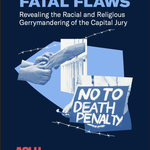Racial Justice Reports
DPI's reports on the racial history of the death penalty in individual states
Overview
The death penalty has long come under scrutiny for being racially biased. Earlier in the twentieth century when it was applied for the crime of rape, 89 percent of the executions involved black defendants, most for the rape of a white woman. In the modern era, when executions have been carried out exclusively for murder, 75 percent of the cases involve the murder of white victims, even though about half of all homicide victims in America are black.
A bias towards white-victim cases has been found in almost all of the sophisticated studies exploring this area over many years. These studies typically control for other variables in the cases studied, such as the number of victims or the brutality of the crime, and still found that defendants were more likely to be sentenced to death if they killed a white person.
The issue of racial disparities in the use of the death penalty was considered by the Supreme Court in 1987. In a close vote, the Court held that studies alone could not provide the required proof of racial discrimination in a particular defendant’s case. This decision appeared to close the door to broad challenges to the death penalty. However, the Court has found racial discrimination in the selection of the jury in individual capital cases.
At Issue
Today there is growing evidence that racial bias continues in society, particularly within the criminal justice system. The existence of implicit racial bias among some law enforcement officers, witnesses, jurors, and others allows harsher punishment of minorities, even without legal sanction or intention. Although these prejudices are hard to uproot, the unfair application of the death penalty could be halted by eliminating that sentencing option altogether.
What DPIC Offers
DPIC tracks the race of those on death row, those who have been executed, the victims in the underlying crime, and many related statistics. It collects the sophisticated studies on racial bias that have been published over many years. Many of DPIC’s reports focus on aspects of this question and some are devoted entirely to the issue of race.
News & Developments
News
Aug 27, 2025
Mid-Year Review 2025: New Death Sentences Remain Low Amidst Increase in Executions
This week we are featuring some articles from the first part of 2025 that we think are worth another look. We’ll be back with new articles next week. This article originally ran on July 7, 2025. At the midpoint of 2025, the Death Penalty Information Center (DPI) offers this detailed analysis of the key facts and themes emerging in the use of the death penalty across the U.S. For more than 30 years, DPI has been the preeminent national resource for timely and trustworthy…
Read MoreNews
Aug 26, 2025
DPI Report Examines the Legacy of Roper v. Simmons and Its Implications for 18- to 20-Year-Olds in Death Penalty Cases
This week we are featuring some articles from the first part of 2025 that we think are worth another look. We’ll be back with new articles next week. This article was originally posted on April 30, 2025. In commemoration of the 20th anniversary of the U.S. Supreme Court’s landmark decision ending the juvenile death penalty, the Death Penalty Information Center (DPI) today released a new report: Immature Minds in a“Maturing Society”: Roper v. Simmons at 20, detailing…
Read MoreNews
Aug 25, 2025
State Spotlight: California Death Row Shrinks Sharply in 2024, Driven by the Resentencing of At Least 45 People to Life Sentences or Less
This week we are featuring some articles from the first part of 2025 that we think are worth another look. We’ll be back with new articles next week. This article originally ran on February 11, 2025. When California Governor Gavin Newsom announced a moratorium on executions in 2019, he said that the state’s“death penalty system has been, by all measures, a failure.” He explained that the death penalty“has discriminated against defendants who are mentally ill,…
Read MoreNews
Aug 20, 2025
Former Alabama Governor Urges Use of Clemency, Criticizes Florida’s Execution Process as “Shrouded in Secrecy”
In an August 14, 2025, op-ed in the South Florida Sun Sentinel, former Alabama Governor Don Siegelman revealed he has“lived to regret” not commuting death sentences while he was in office, and criticized Florida’s execution selection process, citing serious concerns with secrecy and racial bias. Writing about two scheduled executions in Florida — Kayle Bates on August 19 and Curtis Windom on August 28 — Gov. Siegelman argues the cases surface systemic problems in…
Read MoreNews
Jul 08, 2025
ACLU Report Shows How Death Penalty Jury Selection Discriminates Against Black Americans, Women, and People of Faith
A new report from the ACLU documents how the process of selecting juries for death penalty cases systematically excludes Black prospective jurors, women, and people of faith, fundamentally undermining the constitutional promise of a trial by a jury of one’s peers. The report, Fatal Flaws: Revealing the Racial and Religious Gerrymandering of the Capital Jury, examines the practice of“death qualification,” a requirement that potential jurors must be…
Read More


